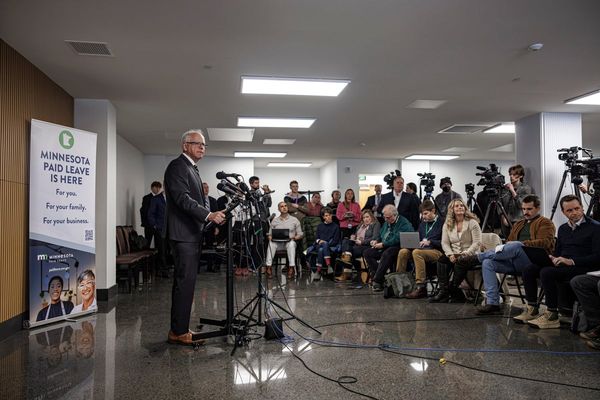
In Jamal Smith’s mind sits a tableau of family he’s never really known. From memories stretched by time, he grasps at fragments of an absent father, an abusive mother, cousins he knew as siblings, and a found family of friends he fears to lose.
Jamal is the protagonist of Son of Sin, the debut novel from the prime minister’s literary prize-winning poet Omar Sakr. It begins in western Sydney, where Jamal is being raised by Lebanese aunties, uncles and grandparents – the extended family of his estranged mother, Hala. Guarded by religion and propriety, they keep the past hushed, and brand Jamal as different. But from whispers, the threads of their secrets unfurl, revealing the sprawling traumas that broke them apart.
And after a sexual awakening on a holy Ramadan night, Jamal’s struggle to find where he fits compounds. Now he must also confront a dormant, dreaded question of self as a queer Muslim boy.
Structured in a sprawling four parts, the novel follows Jamal as he grows older – from teenage years fraught with conflict, to later when he impulsively leaves for Turkey, in search of a homeland and a father he has never known. We follow him as an adult whose mental health is deteriorating, and who hates his job, and watch as his most troubled relationships find various forms of closure.
Puncturing Jamal’s present are memories of childhood; of abuse at the hands of his mother, violent punishments by his aunts and uncles, nightmares full of demons and fear, all reminding him he is ibn haram, or a son of sin.
At school, Jamal finds solace in a group of friends, all outsiders who don’t really belong: Ilo, a burly Samoan boy who likes to leave his hair long, and Emir, a Bosnian who wears pentagram necklaces and studs. They sit around a lunch table discussing Marvel characters, or walk together sharing headphones, listening to Destiny’s Child. Their friendship is challenged by a transgression of trust, but as the boys grow up, they hold each other close: “The last awkward structures of adolescence were falling away, and they were letting them go without letting go of each other.”
Around Jamal’s coming of age, Sakr writes an internal reckoning of race, tradition and identity. But while his protagonist’s story is deeply personal, many children or grandchildren of migrants will know it by heart. Not in the details of its plot, but in the feeling of its very foundations. Because we have grown up with it; stories of steadfast faith, stubborn men, an abandoned home. Of taboos, otherness, shame. But also of finding one’s place.
From his aunty’s living room, Jamal watches the 2005 Cronulla riots unfold on the news. A mob of young Anglo-Australians, beers in hand, chant: “Fuck! Off! Lebs!” Bangladeshi students are hospitalised after the mob are unable to distinguish one dark nationality from another. Moments like these, written from Australia’s modern history, point to ripples of racism and rage still in motion today.
For Jamal’s aunty, who remembers the struggle of life left behind in Lebanon, calling herself an Australian is enough to be grateful for. For Jamal, being unfairly harassed by police is not a price he can happily pay.
But there are moments of belonging too. Outside his aunty’s home as the sun sets over Ramadan, cars pile up, a hungry crowd of family washing on to the street. Around the living room, he laughs with cousins, passing Lebanese food to share. On a beach in Turkey, Jamal makes angels in the sand with a man he falls in love with. On the balcony of their family unit overlooking a street in Mersin, Turkey, Jamal listens to his father and uncle talk over a pan of scrambled eggs and sujuk.
Sakr writes moments like these into vivid scenes, and when they are not heavy with the weight of his protagonist’s conflict, they are laced with charm, candor and a vital sense of warmth.
Son of Sin is the first Australian novel by a queer Arab Muslim man, according to the book’s marketing materials, and though fictive, Sakr’s own experience is subtly threaded through. The novel comes after his acclaimed poetry anthology, The Lost Arabs, and Sakr’s poetic craft has clearly defined his prose, as he weaves Arabic words with dialogue that rings true and a fluid, lyrical internal monologue. During his first sexual experience with another boy, for instance:
He could hear [aunt] Rania hissing in his ears, Ta leon ya ibn haram! Come here you sinful boy! How many times had he heard it? A hundred times, a thousand, more: as a shout promising violence, laced in an affectionate chuckle, a whisper almost to herself, an echo as he was lassoed to her from wherever he’d been, a soft song of ibn haram, ibn haram.
Jamal is often at conflict with himself. In his world, to be queer is to sin, to be shamed – and his struggle from within his insular, traditional, religious community exposes the toxic masculinity it maintains.
To a young Jamal, the consequence of his sin haunts his sleep with nightmares; visions of angels who carry spiked clubs and speak in unfamiliar Arabic with tongues made of flames. They are Munkar and Nakir – angels of the Muslim belief in the Punishment of the Grave, who test the faith of the newly dead. To an older Jamal, this fear morphs into a cycle of hidden experimentation, self-doubt, self-hate and isolation.
He is caught in a liminal space between his family, faith, queerness, Arab-ness, Australian-ness. And Son of Sin is Jamal’s internal fight spilling painfully, and poetically, on to the page – cut through with a hunger to destroy that which oppresses us.
Son of Sin by Omar Sakr is out now through Affirm Press







